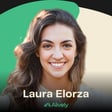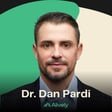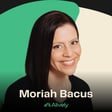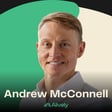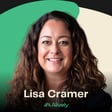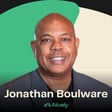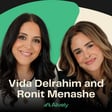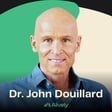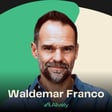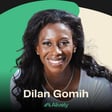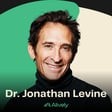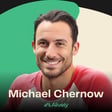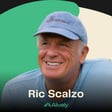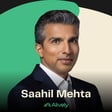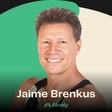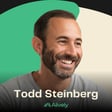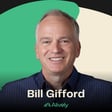Initial Impact of Pandemic on Mental Health
00:00:00
Speaker
I actually was at a point where I was looking forward to go to work. This is that the power of community and purpose. And then as things kind of got prolonged and forcing people to be home, you would see people's mental health be compromised and you'd see the additive nature of that where there they are.
00:00:20
Speaker
having more sick symptoms, their mood is impaired, they're less active. like Everything got disabled in some ways because of that lack of connection and lack of purpose.
Redefining Healthcare Through Role Models
00:00:35
Speaker
This is the Home of Health spam podcast, where we profile health and wellness role models, sharing their stories and the tools, practices, and routines they use to live a lively life.
00:00:48
Speaker
Watch out. Welcome to the home of health span. It is wonderful to see you again. I must say it's kind of cool. I'm going to call you like a new friend here and see in the work that you're doing to change the landscape of health care, delivery of our perception of what health is defined as is bloody exciting. But and to be on this right now is is juicy. So thank you for having me.
00:01:16
Speaker
I love that that's where you started it, because I was going to say, you know, last time we were catching up this idea of what is health,
Shift from Survival to Optimal Living
00:01:24
Speaker
right? And as someone who works as a physician in the medical profession, how do you define health and versus the system, right? Because you're you're one of those that it's not just a calling and a profession and everything, but it's it's a ah lifestyle for you personally as well. And so I'd love to hear from you how you think about that.
00:01:46
Speaker
So and I must say my perception of it has changed over the last few years. I was one to when I thought of health, it's functional. Like, are you able to get by? Are you living? Are you ah out of the hospital? Are you not stuck to a ventilator? And and and now my my perception is changing. and And it's more about how do we live optimally, because We just spent the last four years.
00:02:18
Speaker
really the last four years in in a situation where we we were lacking some of our core needs. Like for example, connection. We weren't we weren't connecting as much as we we would like to. we at At some points we weren't allowed to get to the gym and exercise and and leave
Modern Medicine vs Quality of Life
00:02:35
Speaker
our homes. and And so really there's been a lot of thought on how do we become our optimal selves and thrive. And that's where I like to try and focus. I think there's a lot of people that are at that state where they would love to be out of hospital, they would love to be have more control of their chronic disease. But i'm I'm most excited about people getting to a state where they can be their best selves and enjoy life and enjoy that quality of life. And the nature of my job, we then we we had this conversation maybe Andrew on our our last talk, but
00:03:13
Speaker
it might a lot of work, it's hard to die. like we do It's really hard to die in 2024 with all the advances in in in technology and and ventilators and in in life support, but it's that quality of life. How do we get to a spot where you you enjoy life again and do the things that are important to you?
00:03:35
Speaker
And so that's that's really a focus for me. And I think this is a way we we need to approach it to set the bar high. There are so many things in there I want to impact and absolutely love in that one. I mean, this definition of health and that of evolution from it's the absence of bad things.
00:03:56
Speaker
2, it is the proactive presence of good things. ah The case means good energy. Do you have vitality? Do you have energy? Do you feel good versus do you not feel bad? Are these things not a problem?
Transitioning Healthcare Focus
00:04:09
Speaker
Which is a huge, huge difference that the system overall needs to start understanding it as we move from sick care to health optimization and ah acceleration living that best life. And the other point, this is something that Lou and I talk about all the time of the danger is not that you're going to die. The danger is you're going to spend your last 25 years
00:04:31
Speaker
immobile, losing your mind, not not living the life that you actually want to live. That's the more dangerous problem, not have the death problem in today's world, given all the technology, everything we do to to keep people alive. Because guess what? As long as you're alive, we can build insurance companies and and make money off of it. So this may be the first time, and it's funny to to start here with someone of your expertise, background, and profession. But you started here, so I really like to, if we think about the five pillars,
00:05:01
Speaker
connection connection and purpose. but The one that I think for me personally was the last one that I've come to realize the importance of, wow, this needs to be on equal weight with my fitness, with my nutrition, with my sleep. Did you always know that? Or is it did you see it in the past four years of, wow, again, the absence of this has this impact. We really need to think about it. How did you come to that kind of awareness?
00:05:26
Speaker
ah Thanks for highlighting this, Andrew, because ah it's something that I feel pretty passionate about. it was Honestly, it was in the last four years.
Mental Health Challenges During Pandemic
00:05:33
Speaker
We had a cycle. So during the pandemic, the early stages, my staff and myself, we had to go to work. We had no choice. we So we we had a community with a single purpose, which was getting people through this pandemic. and It was very fulfilling. I actually was at a point where I was looking forward to go to work. Like this is this is that the power of community and purpose. And then as things kind of got prolonged and at times when we weren't seeing the end in sight and we're seeing the school closures. I live in a province in Ontario where we had the longest school closures and one of the longest ones in North America as an example.
00:06:19
Speaker
and forcing people to be home. I was really, you would see people's mental state, mental health be compromised and you'd see the additive nature of that where there they are having more sick symptoms, they're their their mood is impaired, they're less active, like everything got disabled in some ways because of that lack of connection and lack of purpose. And so we we tried to create that
Solving Wellness for Healthcare Providers
00:06:49
Speaker
in some ways. We had an online format for healthcare providers called Solve in Wellness, which we got a grant to study and we're in the second phases of that.
00:06:57
Speaker
and really just trying to be more proactive within. And similar to you, Andrew, I felt this is ah an area where i I needed to put more emphasis on. I still feel like i this is ah my one of my weaker areas, that and sleep, which we'll talk about. But yeah, this is an area where it gets overlooked at times, but the power of it, I'm seeing it on a regular basis. Now, like I went to a conference in May where that, that connection, that, that, that the real,
00:07:30
Speaker
everyone being in the same room together with that same purpose of, of, of learning and optimizing their health. It was so powerful and you left there feeling so hopeful. And it lasted like that was the other thing, like it lasted you and you were able to connect with people online later. And, but that, that power of connection, I think is, is healing and it's, it's a necessity. If we've learned anything in the last four years, please, it's a necessity moving forward.
00:07:58
Speaker
Yeah, we we did not evolve as isolated creatures. like If you think about without modern conveniences, these hairless, not relatively strong or fast creatures were not surviving without working in groups. That's why language evolved. All of this, if we worked in groups, we have evolved to live in groups. And without that without that community, we are not human. we We lose something that's core element to humanity and to the life that we've all been meant to have.
00:08:25
Speaker
so Can you say it's called Solving Wellness? so Yeah, it's a so it was Solving Wellness. we We launched it in, I think it was May of 2021, almost out of necessity. A short version of the story was there was a respiratory therapist that was very normally stoic and
Wellness Tools Development for Overwhelmed Providers
00:08:43
Speaker
and resilient. and We were at this 4 o'clock in the morning and we were looking at a COVID patient that we're trying to decide whether to put on a ventilator or not.
00:08:53
Speaker
And during that phase of the pandemic, if you committed to a ventilator, the patient was going to be on for at least three weeks. Like that was the trend we were seeing. So it was like this loaded decision at four in the morning. And she broke down and started to get tearful. And I'm like, what's going on? And she was just like, i I'm gassed. I'm tired. I've worked so many nights this this week. But seeing these patients go through what they're going through, it's so hard and we're not getting a break. And So I wanted to provide folks with health care providers with an arsenal of of of tools to optimize their health health. So the nutrition side, the movement side, including yoga, stress management, including some ah cognitive but behavioral therapy, advice, and on an online format. and
00:09:48
Speaker
I mean, with full transparency, Andrew, this is one of the endeavors that I wish like I would call like one of my quote unquote failures that I've learned from. Like it it didn't thrive as much as we we thought it would. And I think a lot of that had to do with people were ready to be offline at the time. And yeah yeah and so now we've kind of pivoted. it's ah Now we're doing a study about doing some of this stuff this work in person, but it's one of those things that I'm sure you've experienced as an entrepreneur that at at times you you got to um approach failure as a learning point. And and that's, uh, this was one of the key ones that i I'll remember for sure in terms of, uh, of learning. Yeah. I mean, I go back to Shakespeare and Hamlet that there's neither good nor bad. It's our thinking that makes it so, and it's the same failure. It's just a label that we can decide to put on something or not say, Hey, here's objectively what happened.
00:10:42
Speaker
And I can call this a learning experience. I can call this failure. I can call this ah part of my education. right there There are all these other labels I can put on it. And do I put the failure label or not? That's entirely in my hands, how I wanted to find it. I like that. So having that not sticking as you wanted, as you projected, and you you recognizing the importance of it, and it's a difficult one. What are some of the things you use and do to to fill that bucket today. So I mean, obviously, as an ICU physician, do you have a lot of purpose. And what you you just talked about that, like I was looking forward to going to work, like this purpose was pulling me in. That's part of it. And there's also this social connection piece that, hey, when we were all in it together and going that work, but then that also kind of burns us out. So today, kind of four years removed. What does that look like week to week or month to month to you on how you're able to fill that
Balancing Professional and Personal Life
00:11:35
Speaker
Once again, Andrew, this is an area where I want to get better at. But right now, I use this as ah as a stacking. like i yeah I often stack it with the other components. So ah for example, exercise. So my biggest...
00:11:51
Speaker
outlet for for stress in general is exercise. And i I play on usually two hockey teams. And when we're able to get out, and and so on having the the camaraderie of men's hockey, old men hockey, has been it' it's been so valuable. like it's And it's not so much a during the game. it's so so It's mostly after the game, whether you have your peers or or just hang out outside the rink for a bit.
00:12:19
Speaker
have those laughs. that That to me has been the real, over the years, the way I've formed connection has mostly been through sport. I have been part of a few local gyms here that do a lot of classes and you get connected with the staff and and some of the other members. So we do that. And like even today, my myself, my wife and my sister-in-law, we went to a class together and you're you're you able to form connections that way.
00:12:48
Speaker
And then the other one that maybe is not intuitive is with my family. yeah i'm ah I'm the father of three and my wife's a psychologist, so we're both professionals. My schedule is unfortunately loaded at the least of times.
00:13:08
Speaker
and so trying to be real active and in having connections with our boys and of course obviously my wife too. We try and forge these these times where it's one on one with with but the boys, even if it's for 10 minutes. And I'm saying this not as if I'm perfect at this. I'm saying this is with with the lens of this is the attempt.
00:13:31
Speaker
and And so, yeah, we usually, ah whether it's driving them to their sporting events or at nighttime, just settling in with one of the one of the boys and just hearing about their day. And also, we just recently had a big trip. We went to Ghana and see some family members there and spending three weeks side by side that You can't help but not if you feel connected. So those are those are the main ways of late that I've been trying to feel connected and forge those connections. But I feel like I got to do a little bit better of a job, especially for my friends back home in Alberta, Yari, Jen, Big Mike, ah Brenda. I feel like we could could stay connected a little bit more these days.
00:14:19
Speaker
I do like that social fitness aspect that's becoming bigger and bigger. People are saying, and you talked about making friends at the gym and talking to people that work there, right? Like it's in the past year and a half, two years, stopped wearing headphones at the gym for that exact reason.
Importance of Social Connections and Fitness
00:14:33
Speaker
I mean, let me go interact with these people and we can't multitask.
00:14:37
Speaker
But in that world, we can't because you're filling these two buckets at the same time and you're getting more out of each by doing it because there you still only have 24 hours a day. So to the extent you can really fully be present of, hey, I can sit here and sweat with you and alongside you and push each other and do all these wonderful things. It's a it's a truly beautiful thing. So to interrupt Andrew, but I got to take that advice over about taking the headphones off at the gym. That that's my next hack.
00:15:03
Speaker
Yeah, it's a I obviously get through fewer podcasts like this, with it but I think I get get some other benefits. that It's a bucket that I have to work on. I also like that you pointed out, because I think a lot of people see on social media or books or TED Talks or podcasts, and like, oh man, i like if I had it all figured out, like that person would be fine.
00:15:25
Speaker
No, the reason we're talking about these things is because we're in the process of figuring it out. We wouldn't be talking about it if it wasn't a struggle and something we had to figure out in the first place, because it would be so obvious to us that we wouldn't think to talk about it. We only talk about the things that aren't obvious, that tos that that we're having to work on. So I really appreciate the transparency and the vulnerability there that
Empathy in Patient Care
00:15:50
Speaker
you're sharing. Absolutely. andrew Because that's what I mean, I think you you and I have this in common is that why people feel connected and inspired by some of the content that we throw out there is because there is an element of vulnerability there. It's a realism. And I i wasn't cognizant. I never put too much thought on this. This is just the way I show up. but But yeah, being real with folks allows them to feel connected to you. And I do this also.
00:16:22
Speaker
Clinically like I one of the most powerful moments like ah I have is with families near end of life like when their family love members are dying and it's a reason why I did palliative care training as well and one thing that's totally changed the lens for me is after losing both parents is I completely have a different perspective as somebody that's been on the other side. And so, I've i've shared that with family. i've i've I've said, listen, this is how I'd approach this. is ah This was my loved one. i've I've lost my dad. I've lost my mom. And this is how I would approach this. I wouldn't want to see them suffering in this way. I'd want to be there. I'd want to hold their hand in their last hours and and
00:17:10
Speaker
talk about the memories and why you love them and and that vulnerability that you have in that moment. I'll tell you, just from the the feedback we've gotten from family members, it makes a huge difference on the experience because that and hopefully you haven't had to deal with much of this. But those days, hours leading up to your loved one dying is something you will never forget.
00:17:38
Speaker
You don't you won't forget any part of that. And so it to make it the least painful of an experience as possible to me is is is paramount. That real empathy oh of sharing of yeah this isn't an expert on high saying you should do this. This is a human being who's been through this experience saying here's what I would do.
00:18:01
Speaker
because I've been through this. And you can relate to me as a person versus someone in a white coat, whatever, telling you what to do. Yeah, thank you for sharing that. We'll come back to the sleep, but saying that the things that have a harder time with, but instead, I'd like to jump next to the fitness side, right? As someone, you know, you've talked about the the two different hockey leagues and obviously a very, very active.
Adapting Fitness to Life Stages
00:18:24
Speaker
You're growing up, but in a different season of life,
00:18:28
Speaker
with three kids, with the job. It's very different than when we're a teenager, what fitness can look like and what you're able to do today. So what is your fitness routine? What what does that look like for you? So I'll give you two buckets, Andrew. One is the work week where I'm and doing an ICU you week where I got to be at hospital anywhere from seven to eight in the morning and be ready to go and not sure when I'm getting home.
00:18:57
Speaker
And with that first version, I'm all about consistency and efficiency. So I will bang out a 10 minute workout in the morning and The first thing, so the two buckets that I like to do for workouts will be either a kettlebell routine, which is usually like a Tabata swings or Tabata goblet squats, depending on what area of my body ah I'm going to focus on, but a classic one for me is
00:19:28
Speaker
Tabata, kettlebell swings, have a quick warmup where I get my core, especially my core, I've had lower back issues in the past, making sure my core is primed and then just jump into that. Before we jump from the Tabata, can you define that it's the 2010 for how many minutes? Oh, sorry, yeah, I should back that up. Yeah, so it's 20 seconds of as fast and hard as you can go and 10 second break recovery for eight rounds.
00:19:57
Speaker
So depending on how good I feel in that morning, I might draw do two Tabata workouts or i'm or I'll just do one based on how much time I feel like I have in the morning.
00:20:08
Speaker
Yeah. And so a couple of things on that, if you if you don't mind, just the the research on that. So that's four minutes. They did these studies that people doing that versus people, I think it was cardio on a bike or something for 30 minutes, um, had even better, better impacts and results. And so it's, it's super efficient. When you say I don't have time, you're just hearing someone who you would hear at that time. You're like, well, you just clearly don't have time to work out that. And he said, no, i'm I'm going to carve out 10 minutes. And guess what? The difference between zero minutes and 10 minutes,
00:20:38
Speaker
is infinitely bigger than 10 minutes to 60 minutes. Just getting that something in is hugely impactful and you can get quite a benefit like the TAPATA workout. So I appreciate you sharing those. I couldn't phrase it any better, Andrew, do about the data to support it. like this is why the myth busting or whatever the term is would be so valuable right now because a lot of people think, yeah, you got to bang out that 30 minutes of steady cardio, whereas this is just as efficient or just as beneficial or more, especially if you add the like the the weight elements, the resistance training to it.
00:21:13
Speaker
So yeah, ill I'll do that depending on how much time I have. The other one I'll do is like a whole body circuit. So I'll do in our basement, because of COVID, I was like, we're never doing going without a gym again. So I got like a proper gym downstairs. So I'll do a push. If you want details, I'll do ah five by five, a circuit of five um bench press, and I'll do five of ah posterior chain, so like deadlifts, and then five squats.
00:21:47
Speaker
And I'll just go do a cycle of that and different variations, like sometimes it's classic deadlift, sometimes it's Romanian, sometimes it's Sumo, and just do that in a constant cycle for ah five rounds of five. And so the weight isn't necessarily super heavy, but because I'm doing that and finishing in about eight to nine minutes, your cardiovascular wise, your your gas,
00:22:11
Speaker
Yeah. And so it, but it's efficient. Like you're done. Like that's my workout for the day. And because it's not like totally fatiguing the muscles, I could
Innovative Fitness Techniques
00:22:20
Speaker
do that every day. Like I, or I'll do it five days a week as an example. And then the last one that I'll do, which my trainer got me on, shout out to Emma Beeson at the landmine training, which is like,
00:22:31
Speaker
ah you I gotta show you this link of the Line Mine University. It is so absolutely game-changing. So it's you you got the Line line Mine, so the the Olympic bar fits into that socket, and you or you could just put it in the corner of the gym or the wall.
00:22:48
Speaker
and you're basically doing these explosive exercises ah that are great for, like it's like a cheap man's power lifting or the it's like a safer version of power lifting. So I'm gonna give it, I'm just gonna show an example. of ah So there's no audio for a second, but I'd be cleaning jerk. You're literally down down here, pull it up here and then snatch it like this.
00:23:17
Speaker
And you so you do the you you get there's a whole bunch of of variations in terms of sets and obviously weight. and you could do one of those workouts for 10 minutes, you are done. And I can't believe how much benefit I've gotten. Like I've actually gained a little bit of muscle mass focusing on the landmine side. And my my my coach, Emma Bissenet, she's done some training locally here and it's it's growing and in in popularity, but that's another one that I'll do during the work week.
00:23:52
Speaker
Yeah i need that doesn't nice to because i was working your body in the quadrants rate so very good for the balance to to avoid injuries down the line. And the power side also like translates well into sports. like i've Right now, I'm a bit old man, so like ah somewhere I'm doing baseball or softball, taking the break off of hockey. But yeah, even like home run swings, man. like I just feel like it's all translated well since entering my life. It's a great combo. So you have the the social fitness side, and then you have the super efficient, this I'm cranking out at home side, and getting the right equipment to to be able to do that with a home jump.
00:24:29
Speaker
For real. And not to drag this out too much, Andrew, but ah the other aspect is if I have like a week like this where I'm clinical or non-clinical doing administrative work, I'll do a class or I'll just do focused strength training where I typically you do five by five. So like it's a chest day, it's a back day.
00:24:53
Speaker
It's a leg day and uh, bring that out usually at home. Uh, but yeah, I like doing the fitness classes as well for the reasons we, we talked about before. So, I mean, you brought up a point within the fitness that I think it kind of leads us naturally on the sleep and recovery side of you're not using high enough weight that you need 48 hours of recovery around it. And so I think this is,
00:25:18
Speaker
This is something that the science may still be out there, but people are learning more of, hey, if you push yourself to 100%, you may over the long run end up not as far advanced but because of it the time you have to take off, not just on injuries, but the time for the
Balancing Intensity and Recovery
00:25:32
Speaker
recovery. And so for training, depending on what your objectives are, you may be actually better served for this kind of approach. So how do you think, and maybe we'll talk about them in two separate pockets, the the recovery and the sleep, because it sounds like sleep is a little more difficulty, but on the recovery side,
00:25:48
Speaker
are there any kind of products or anything that you do or use to to help your body recover or your mind. Yeah, so first point I'd like to ah illustrate, Andrew, is that the whole point of not pushing myself to too hard. like So my goals, just to clarify, I've been like staying functional and not injured after hurting my back a few years ago. That was I mean, everyone's hurt their back, but that one left me scarred a little bit. So functional and strong. Like, I like to focus on strength. And the book Easy Strength kind of changed my perspective on how to pro approach it. It's then John and Pavel Tetslutsin. And they have this program where
00:26:29
Speaker
It's a concept of like being farmer strong. like You know how farmers are like the strongest people you've ever met? And they're not necessarily lifting doing one rep maxes for a lot of the stuff that they're carrying. It's just because they're constantly using their muscles. So it's it's the same principle where you're doing whole body exercises, but not to max, and and using an approach like that, that you will see some strength gains. You won't necessarily build up the like the bulk up, like if that's part of your goal, or but getting strong for sure, I've seen some benefits that way. And and so my recovery, i there's a couple of thoughts that I have, and I don't necessarily have
00:27:11
Speaker
the best science to back this up. It's mostly just what I find is works for me. I like to if I'm overdoing it, I like to drink BCAAs because I know that there's some data to support that ah reduces delayed onset
Listening to Body Signals
00:27:25
Speaker
muscle soreness. So that keeps me functional the next day. I'm a big believer of of stretch, like doing some stretching pre like dynamic searching pre and then paul like I'm not always best at doing it immediately post, but my evenings as a wind down, I do some, do some stretches, which I think in my opinion helps out with the recovery side. And then third, I just kind of listened to my body, like having injured your back.
00:27:55
Speaker
that that to me has been a ah signal or a a way of exercising of that quote, listening to your body. Because if your back's feeling like it's not ready to go, then you give it a break and then it's okay to work on other things. Maybe you're working on core that day as when you thought you'd be doing some back. So in terms of recovery, just listening to the body and giving it a break. And then lastly, I'm big on like walking. Like I feel like as much as I can, I'll make any excuse to walk. Like if I could, if I had the time, walk to work or walk back from work, even if it's one way, like, ah and i I personally feel like this is a good way of adding some recovery to your to your your daily practice, but i'm i I haven't done too many sexy things. Like I've never, my boys, we have a nice bath, like from a neural cure.
00:28:51
Speaker
How do I say it? Yeah. And we, and so the boys do it. I just, I got to get, get enough going. I got, I got enough strength to do it. I i still, am I can do the cold shower, but I still, uh, I haven't done that. And then sauna time more, more for like,
00:29:13
Speaker
For me, it's more the longevity data, but not necessarily recovery. I know there's some Huberman data to say, or I shouldn't say Huberman, I heard on Huberman, some data to support that maybe there is some some recovery purpose, but i' I'm not ah totally up to date with the science.
00:29:33
Speaker
And on the sauna air, are you using dry sauna infrared? Like what kind of dry song like classic sauna? And I'm, I won't lie. Like I love it. Like it's my favorite part of, of our household is you, you get your workout in, you go, go for a swim, whatever it might be. And then you just dip into that sauna for a little bit. Oh man. And and it somehow could get up to 180 degrees in that bad boy. It's, it's, it's a W for sure. Yeah.
00:30:02
Speaker
It's something pretty great. I was in Finland last winter and yeah know going those where they do that next level and then you're jumping in the icy pond and everything. Did you do that? I did while I was there. yeah so i was I was by myself. you know It's like 10 o'clock at night, I'm by myself, and so I'm pushing it and come back. I was like, you know I started at 30 seconds, I did 90, and then I was at like five, five and a half. the guy's like we That might be the record. I'm like, whoa, I'm glad I didn't know there was a record because I probably want to stay longer than I should have. I was just trying to build it up as I was doing my rotations.
00:30:34
Speaker
but yeah it's ah You know normally in the winters I swim year-round in the ocean So I just kind of treat that as I spent the the water itself is not that cold But when you're in it for an hour plus I mean it it really is sucking the heat out of you and I don't warm up for another eight hours or so after So it's as cold as I need That's pretty good recovery routine. What about on the sleep side because it sounded like that one was one you might have a little harder time with oh man, so this My problem for sleep, just to be concise, Andrew,
Challenges in Achieving Adequate Sleep
00:31:07
Speaker
is just the duration. like yeah That's my main issue. Have a tough time going to sleep right after the kids go down, and I have to wake up early because of my job. And so you end up going to bed. I end up probably falling asleep before midnight, 11.30 to 12, and then
00:31:26
Speaker
and then getting up anywhere from 6 to 6.30 usually. And so it's not the optimal duration, but because of that, I try and manipulate my quality of sleep. And so what I do at the beginning of the day, as much as I can, so I do my workout, then I'll just go outside and make sure I get some some sunlight first, like after my workout, maybe sip on the coffee for a little bit and then start to giver, knowing that what we have ah in store for the day ahead. And I will start thinking about sleep roughly after supper, so little things. So I try not to eat too late for sure. I've noticed that if i I have a big meal, it affects my sleep quality. I try not to, I've been totally reduced my alcohol intake. So I,
00:32:19
Speaker
i do I don't try and drink. My goal is not to drink at home. It just drinks more socially, like if we're out for dinner or out with friends. So that to me has helped as well for quality. Then I'll put on blue blocking glasses.
00:32:36
Speaker
in and around the post supper, especially if we're watching some Netflix or whatever it might be, or you're on your phone. I tell people this, but I'm not the best at this to try and be on screens after an hour before you're you go to before your bedtime. i and I'm not good at that. I'm good at not scrolling my screen before bed. Like that, that to me, has been the W, the change that I've over the years. but My phone is still in my room. I still use it as an alarm, so ah I'm still doing that. I'll ingest some magnesium glistenate right before I go to bed, about 400 milligrams. What brand are you using? Oh, we're using Guyattum, our new brand.
00:33:22
Speaker
second and and Did that come across? Yeah. Oh, yeah. Nice. There we go. Yeah, turn it. There we see it. Yeah, there we go. Our new brand that we we've launched um just Health Canada approved using high quality ingredients. So many people were asking me what do I like to take and so I figured let's start our own thing. ah so that So that's the type that we use. Is it available in the US?
00:33:49
Speaker
Oh, absolutely. Available in the US and well we'll have a promo code for a lively folks. And yeah yeah, we want to get the, wow well, we'll get the word out for sure.
Improving Sleep Quality
00:34:01
Speaker
Yeah. And then or in terms of other parts of sleep, I use eye cover. ah I don't use earplugs. I don't like the feeling in my ears.
00:34:11
Speaker
Um, well, some, um, I feel like I'm missing something. Oh yeah. It's stretching. I just like to do a little stretch routine before we're going down. No screens, just quiet. And, uh, that's pretty much, and then cool, cool bed. So a little big fan of, uh, chili pad, uh, big, like that's a game changer and, uh, blackout blinds, all the right things.
00:34:35
Speaker
Now, so, you know, i I asked for me, it was a huge game changer. And you talk about chili, but absolutely. Right. I sleep hot. knew that That was next level unlock. But the eye mask, I had no idea how light sensitive I was. And especially if you're traveling, you can't always have blackout screens, but that you can kind of get it. Now, I heard you say you don't like the feel of the earplugs, but youre you have ear pods and now. So it's something that like it may be the type that you have. I don't know if you've tried wax earplugs.
00:35:04
Speaker
But getting wax earplugs from me was another kind of unlock game changer, dead cheap, super, super effective and totally moldable in a different way than putting those phone things in. So I got to try that. I got to try that out because ah yeah, I've been like they would fall out in the middle of the night and yeah the pressure like I felt like it was like a lot of pressure because I like to sleep on my side. Yeah. And it wasn't awful. I just I figured is a, you know, maybe i'll I'll abandon it because I'm doing all the other things. But yeah, ah ah I'll definitely try out the wax. I don't think we've we've done that.
00:35:42
Speaker
Yeah, it's totally, I got it for my whole family. Everything went as soon as I got it. I was like, okay, everybody's getting these. These are great. So hopefully that's different, but just throwing that out there. You you brought up, so as we think about ah magnesium um and not eating dinner too late and other parts, right? It it impacts our recovery, our sleep, our fitness, the whole nutrition side. And I think back to my dad,
00:36:08
Speaker
that was a pediatric cardiologist and got him the four hour body by Tim Ferriss. and And you read that, like how to lose all this, go slow carb diet, loses 65 pounds in a year, start treating him with marathons. Yeah. And he said, basically, I just had to unlearn everything they taught me in med school about nutrition. And it yeah I was listening to Peter Atia podcast on lactate yesterday, like his his deep dive. And he was like,
00:36:33
Speaker
We put everything they teach us in med school on this in in high school in college in the textbooks is scientifically wrong. And the guy said, yeah, I mean, so it's it's crazy. We take these things as fact when not they're they're not necessarily facts. So I'm curious, you being in the profession, but also being personally thoughtful of, hey, I'm not going to take this as a word from on high. I'm going to test these things out. What does nutrition look like for you now?
Questioning Nutritional Conventions
00:36:57
Speaker
I do want to emphasize that point, Andrew, that my eyes have been open now too. Like yeah is your dad was kind of alluding to when it comes to nutrition, when it comes to many things that we've we've come across over the last few years. like My eyes are open, so I take everything with a grain of salt now. ah don't I'm not quick to judge when people say, as an example, carnivore diet, that's crazy. Maybe, but it seems to be working for some people. And and so like ah let's not just close the door, because it sounds ludicrous, and we've been told we need fiber and vegetables and fruits our whole lives. like Maybe let's just hear what people have to say. So I got to say, like in general, my my eyes are more open than they ever have been.
00:37:42
Speaker
But when it comes to my own nutrition, and a few things have changed over the years that has made a massive difference. So one is increasing my protein intake. And I think this is somebody that something that almost everybody in their mother probably needs to implement in their lives. So I i aim for a gram per pound and I'm i'm about 200, 205. And so that's a lot of protein.
00:38:09
Speaker
And I just feel fuller. I feel like my lean muscle mass has increased. I feel that after wearing a continuous glucose monitor, I've seen the differences made in terms of ah ah insulin sensitivity.
00:38:24
Speaker
i it's just you ah Everything seems to get better. I have less cravings. Everything seems to get better with the emphasis of protein. Are you able to get all of that from your meals or do you supplement on the protein? set Because you talked about taking some BCAA is for recovery. What about the protein set? Yeah, that's a great question. So maybe I'll take a step back. I've been doing intermittent fasting or a better term probably is time restricted eating or just basically skipping breakers for the last five to six years.
Enhancing Nutrition for Health Benefits
00:38:57
Speaker
And I've, my body comp was great, like percentage of body fat, but I did start to lose a a little bit of lean muscle mass and I probably lost
00:39:07
Speaker
Yeah, I probably lost three or four pounds that I didn't need to lose unintentionally. And then until kind of like the protein revolution for lack of a better term came, I start to take that more seriously and get to where I want it to be. So short version of that answer is and now I supplement. So usually my first calories are a protein shake, guyata, obviously. And I put a little, it varies on day to day, but if I'm at work, there'll be something like a vanilla, vanilla powder with some almond milk and that's it. And then ah I'll eat probably about an hour later.
00:39:49
Speaker
But yeah, now these days i'm I'm adding some protein powder if I don't think I'm going to meet my my protein goals. But some days, like on a weekend, as an example, I could easily rock that out. Like I'm a lot better at just more access to food and less distractions. Most days, though, I'm i'm i'm supplementing.
00:40:11
Speaker
and So that makes a ton of sense on the lean mass and everything. And especially as as we're both getting older, right it's it's harder and harder to put that on much and maintain it. What about creatine? I started to reintroduce creatine because I feel like in our, at least in our demographic, when we were younger, we were all taking it. Then for some reason it fell out of favor. I don't remember why. And then now it's totally taking, we're seeing in ah another resurgence. But yeah, I take it daily. That's like,
00:40:39
Speaker
There's not that many things I take daily, but ah that one for sure is a no-brainer for me when it comes to increasing lean muscle mass, strength, recovery, cognitive function. It's just a it's and the that is how well studied it is.
00:40:55
Speaker
an absolute W. and dead cheap right that cheap There's tons of evidence on it, and it's very easy to just like make it a daily habit. It's no brainer. Just get that win in, as you said. Absolutely. But yeah, otherwise from a nutrition side, like i That's been my main guide post. Like I'll tell you, I'll, so high protein, it's usually animal protein and I don't really care what what kind it is. And, uh, I will, lots of vegetables, uh, a little bit on the fruit side. Uh, the, like the, if I know ah I'm going to have a higher starch meal or I try and have it at in the evening, cause I find that could make you feel a little bit sleepier if anything. But yeah, for lunch, I'll, I'll try and reduce my carbon intake.
00:41:42
Speaker
and then And then yeah, usually with those changes, though I gotta to say, like I feel great. Like that's the one thing that I don't know. A lot of listeners might have that afternoon lull or post lunch lull or post breakfast lull. I don't get that anymore since making some of these modifications and it's refreshing.
00:42:01
Speaker
It's a really good point to me or a like my dad losing six five pounds. I go man. He must have ever really been starving himself and my dad's point was I was never once hungry because if you're getting the right amount of protein in your diet each day and you're loading in enough real plants not plant-based because that sugar is plant-based like I can go eat handfuls of sugar and that's plant-based that's not eating plants. Go eat plants and you load all the protein you need plus plants. You're only going to want so much other stuff. like that It's so satiating on what you need and your body's getting what it needs from that food. That being said, so you you do have some things you supplement with, if I'm not going to get enough protein from my diet because I have this restricted eating window, I'm going to supplement there. Creatine, there's I couldn't eat enough to get enough of that in, so I'm going to supplement on that because I see the benefit in the research.
00:42:50
Speaker
magnesium because I see and we have some depleted soil, so maybe the nutrients I normally would be getting from this food isn't carrying through. I'm going to supplement on top of that. Are there any other supplements, that whether it's daily or not, that you say, hey, yeah, I kind of monitor my vitamin D and the winners, I'm going to throw that on, or B12, or whatever it is that you might do?
00:43:10
Speaker
Yeah. Yeah. I mean, I feel like we're cut from the same cloth. I don't, I don't think that much more the vitamin a D because of being in a Northern like I'm in in Canada winter months for sure. I'm, to I'm, I'm supplementing with vitamin D and then the other one The only other one I take daily, at least off the top of my head, is the is the fish oil. I just see enough data to support the for protecting your brain, ah reducing inflammation now that I think it's worth it. and you know
00:43:43
Speaker
we we We supplement that with Guyata, but it's there's evidence to support that too. And I just feel like I'm not always getting high quality fish. And so I think to me, it was just a nice easy way of of ensuring that i'm I'm getting that fish oil. Yeah, that's fantastic. Makes a lot of sense.
00:44:07
Speaker
All right. So the, the one that you said would come from the same point, that's why I always love talking to you. Like I always learned, like it's, it's the same class, but it's like that enough difference. And it's like, I'm going in
Growth Mindset in Healthcare
00:44:18
Speaker
the same direction. You take me that extra 5%. It's like, so so on, on mindset, right? Were you out of the box this way? Is it something you came through in high school, right? You were in the medical profession and it both my parents being physicians, like there's a path there of,
00:44:36
Speaker
we're taught facts. This is what the truth is. I know and it's objective. There's a flip side of this of there's new research coming out daily that are challenging things that we thought were facts. And so how and where did you come into this mindset of, Hey, it's not fixed. Like I already know this, but in more this growth of, I'm going to keep learning because the world knows more. I want to learn more too. Yeah. Can can you talk about your attorney there?
00:45:03
Speaker
You know, I think what it was, Andrew, was a bit of lack of confidence, actually. I was thinking about this the other day because by no means am I your typical doc. At least I did training in internal medicine, which is usually super type A, super anal, cross every T, low risk approach to health. And um but I'm by no means that way. i I'm ah outside the box sinker, always keen on learning why this might may or may not be true. And ah medicine kind of unintentionally, I think, got me more in a black and white approach to my thinking.
00:45:47
Speaker
And like this is right or this is wrong, this is the way or this isn't the way. And once again, now the nature of the pandemic and just opening my eyes to things like I've i've really pivoted into questioning everything. and and But even up to that point, because medicine was evolving always so much to feel secure in in answering a question about this is the best way to approach this. This is the definitive answer for this. you You can't always feel that confident. And you see enough cases where what it was supposed to be classic, like you have these patients with all these classic symptoms. This has to be a heart attack. This has to be a pulmonary embolism.
00:46:30
Speaker
And it isn't. It ends up being some weird and wonderful thing. So when you see someone that's overly confident in medicine, that to me is always a flag actually. And i if I see it as a trainee, I squash it. No offense to all my former trainees. But if you're overly confident when you're you have only seen X amount of patients,
00:46:51
Speaker
but You got to nip that in the butt because that's only going to get worse or they'll learn the hard way or the patient will learn the hard way. So ah to me, yeah, this is something that's evolved. and But I think what we need right now and and in terms of mindset and health care is an environment where people can think outside the box. like i I mentioned this a lot in my in my book, Unapologetic Leadership, about the importance of outside the box thinking. like I've seen it.
00:47:22
Speaker
directly save lives. like ah yeah Just a quick story. If we have time, and there was a patient that ah that we had where they were in a halo. They had their tube in for their breathing and a halo being a neck brace because they broke their neck. And they somehow got rid of the tube out of their mouth. And what was happening was their airway was closing. They were called stridorists. The airway was, yeah if I had to guess, was the size of a of, ah I don't know, like ah a dime or a penny. And so you you had to like get it to back in urgently and we call for over help, for help. And we were in trouble. She was going to die if we didn't do something. So I'm in there.
00:48:08
Speaker
sorry for the details, but with a camera trying to find a way to get this tube back in. And this respiratory therapist who was young at the time suggested this way of creating more oxygen for the patient. So they basically put a tube that would go from from the nose and we'd put it we'd be able to bag the patient through their nose essentially. 90% of the people in the room have never seen that, but they saw it once and they thought it would be a good idea.
00:48:34
Speaker
Because they had that psychological safety, because it was an environment where you're allowed to think outside the box, it felt okay to verbalize it. And i I promise you that patient's life got saved. It bought me another five minutes and then you could put the tube in and I was like,
00:48:50
Speaker
Holy cow, we'll call her Patricia. Thanks for bringing that up. i I remember she said it, she didn't even say it loud. She was just like, what about the hoop Hooper maneuver? I was like, yes. Like oh I was just desperate and holy cow. And so like that whole outside the box thinking, having that psychological safety to me is something that I truly embrace and that we need in healthcare care right now in general, because yeah you're in the US system, I'm in the Canadian system.
00:49:19
Speaker
Canadian system is, unfortunately, we're not winning.
Mindset Strategies for Anxiety
00:49:23
Speaker
And we need so a little bit of of transformation and we need a lot of emphasis on preventative health. and And so I think this is the time that we we should be thinking outside the box. Yeah, I mean, the world can't generate enough funding to address the sick care. It's just not going to work. If you look at where the population's going, everything. Yeah. That's, I mean, obviously for, for the mindset and developing that your book, unapologetic leadership, a great place to start. Are there any other exercises, apps, tools that use like, do you meditate? Do you do breath work? Is there anything to for your personal kind of clarity and mindset? Yeah, I love this. So
00:50:02
Speaker
Going back a few years, I used to do a little bit of the Wim Hof stuff. I don't know as a swimmer. of nice man yeah Iceman. Without doing the ice stuff, I would the ah just thought the breath work got me into some mental clarity that that really felt amazing. and so i That was my introduction into breath work. I and like the Hooverman's, he calls it the Physiologic Psi.
00:50:33
Speaker
Yeah, exactly. yeah So i'll I'll do that ah sporadically throughout the day, like not necessarily routinely. I've found it absolutely helpful for mindset, to just a gratitude journal at the end of the day. That to me has been a real game changer because you' you'll have this day where you're pissed off at the world and you force yourself to kind of reevaluate your day and find the sweet spots. And then you'll find these moments that you totally forgot. Like ah that time where, like I was thinking about one yesterday where my my eldest son made me laugh so hard. We have this game where we do it, we call it l LOL laugh out loud. we We have a competition amongst the five of us. You gotta try and make each other laugh. And the last one, the only one that doesn't laugh wins or whatever.
00:51:27
Speaker
And so I can't remember exactly what he did, but he literally had me like on the ground, huddled over. at night and And it was like, yeah, man, i would I don't know if I would have reflected on that if I didn't put that in the journal. And then the the last one that that comes to mind when it comes to mindset, and this one's relatively new for me, but Simon Sinek, I came across one some of his uh, one of his quotes ah about nerves, about, uh, anxiety. And when you're feeling anxious in the moment and, and he was mentioning how you could just, those same physiologic symptoms as comes across like when you're excited. So change that mindset, uh, just Hey, reframe and be like, this is an opportunity to be excited about X, Y, or Z. And I don't know, I've been finding that super helpful lately. And it's.
00:52:25
Speaker
And you know when you think about changing them, like there's not much upside to thinking about dwelling on the negative and where this this opportunity could go. But if you think about all the possibilities and why it might be exciting, there's fuel. So it's that's that one I came across a few weeks ago, and I've been trying to implement that on a daily basis. It's been awesome.
00:52:47
Speaker
I mean, to to really come full circle on this, it gets back to that Hamlet quote of there's neither good nor bad. It's our thinking makes it so in that it's this label we put on is this excitement? Is this nervousness? And I remember not to name drop, but in 2019, I was with Andrew Huberman. And we were talking about in a race like the gazelle and the lion physiologically are having the exact same things happen in their body as they're hunting.
00:53:17
Speaker
Right? Like the elevated heart rate, all this. It's just one is this excitement I'm about to eat. The other is this terrified I'm about to be eaten. And so later in the day, somebody's talking to us about flow, the idea of flow. And Andrew Hooman saying, hey, is this what like Feynman was talking about? His work, he saw his play. Is it the same thing? And so I started talking to him, I was like, I think this may be similar to The Lion and the Gazelle. It's the story you're telling of when I'm in it.
00:53:46
Speaker
Is it is this level of challenge and proficiency hitting? Is it this people from is this a game, right? Like, am I playing this game? and and And it's the story he was telling himself, is this is this game that I'm playing? um And so, yeah, I i just I love how i love that all the way around.
00:54:04
Speaker
We're being lions over here, man. Ironically, Guyata is lion in Ganyin, so I call it my spirit animal, baby. So yeah, i I'm all about that. Nice. So we really came full circle there. He comes back to the lion and the guy. This is fantastic. Well, Kwajio, this has been fantastic. Before we sign off, where can people find you, learn more about it? Obviously, we'll have your lively page with everything we've talked about. Where else should they look for you?
00:54:34
Speaker
ah Once again, Andrew, this has been so much fun connecting again. yeah This is just a great format for people to get optimal health advice. But i for us, you can find us anywhere on social. We go at at quadcast, so K-W-A-D-C-A-S-T. ah We're on Instagram, YouTube.
00:54:58
Speaker
TikTok, X, Facebook, LinkedIn. ah We have a newsletter, we'll call it quadcast.substack.com, where we have all our content. A podcast called Solvent Healthcare, care you can find it anywhere. We have a TV show also, you can see that on on YouTube, Solvent Healthcare TV, where else we got the book on apologetic leadership.
00:55:24
Speaker
You find that on Amazon, Guyata Nutrition, so GuyataNutrition.com for our latest supplement company. And where else can you find me? I think that i think that is everywhere. But yeah, we're we're everywhere. We try to spread our wings. So yeah, thanks again, Andrew, for this.
00:55:45
Speaker
Thank you for joining us on today's episode of the Home of Health Fan podcast. Remember, you can always find the products, practices, and routines mentioned by today's guests, as well as many other health fan role models on the lively.com. Enjoy day.

